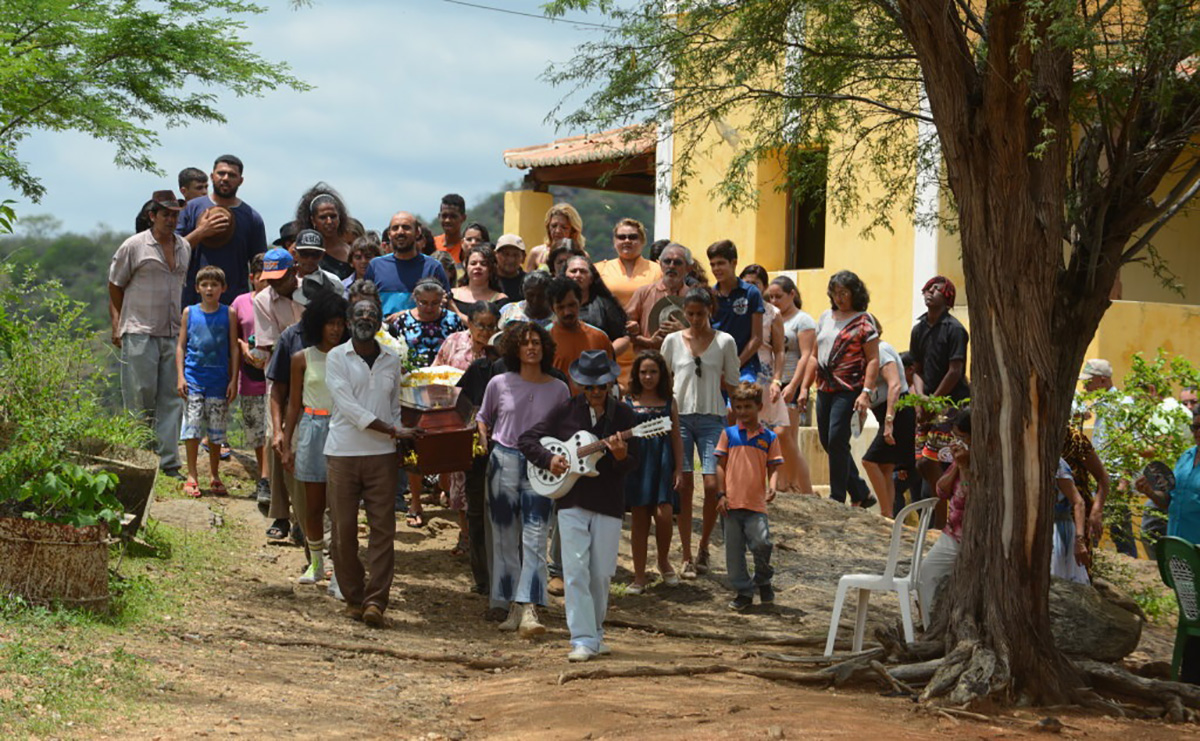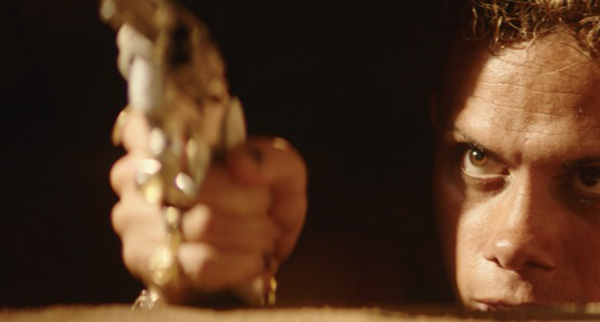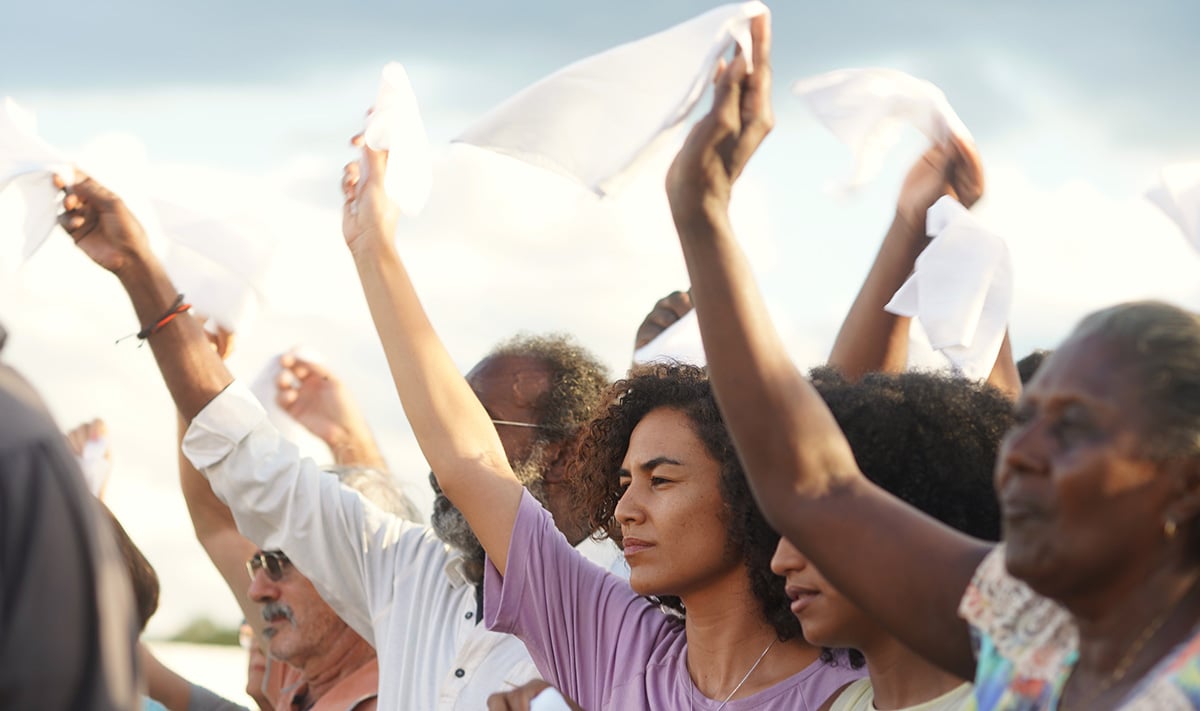In the face of pandemic panic, presidential hissy fits and the irrelevance of a great many things (celebrities, the stock market, sports) one film offers some grim comfort.
What makes Bacurau the film of the moment? It isn’t so much its genre affectations, borrowed from earlier work (John Carpenter looms large) or even the underlying class consciousness, it’s the way that it speaks to this particular time, offering useful lessons on solidarity, collective action and the need for grandmothers.
Bacurau was released last spring, picked up the Jury Prize at the Cannes Film Festival, and proved a box office bonanza in Brazil. It was supposed to open at the Vancity Theatre in Vancouver, but in the wake of COVID-19, it looked as though Vancouver folk wouldn’t get the chance to see the film.
But there’s a spot of good news. The film’s distributor Kino Lorber recently announced that they would be working with different art house cinemas to offer something called the “virtual theatrical exhibition initiative” meaning that you will be able to watch Bacurau online and support your local cinema at the same time.
Co-directors Kleber Mendonça Filho and Juliano Dornelles have been plugging away on their movie for the better part of a decade. And now, suddenly, it couldn’t be more necessary or apt.
Those lessons it teaches? Here’s what stuck with me...
Lesson 1. Don’t trust politicians
In a tiny dusty corner of Brazil, the village of Bacurau is barely a blip on the map, a small collection of sun-bleached buildings including a store and a medical clinic that doubles as the occasional brothel. But despite its threadbare appearance, the locals seem content, working together, puttering about their gardens, keeping watch on the only road into town.
The action begins with a young medical professional named Teresa (Bárbara Colen) hitching a ride home with the water delivery truck. The death of the town’s elderly matriarch (and Teresa’s grandmother) has necessitated the young woman’s return, but even before she makes it home, things are looking a mite strange. A traffic accident involving an overturned truck carrying a load of coffins might set off your spidey senses. The tingles continue at the funeral services with the townsfolk ritually ingesting a psychotropic drug that brings on strange liquid hallucinations.
Whether we’re witnessing collective visions or something else isn’t exactly clear and in the midst of this disorientating/discombobulating feeling the film does its best work, flowing easily between observational documentary to something closer to magical realism.
Seems a fight over a dammed river has left the town without access to water, a reality that comes to light, when a fat cat politician by the name of Tony Jr. (Thardelly Lima) rolls into town. In the blink of an eye, the villagers vamoose, leaving the politician offering speeches and shitty bribes (used books, expired food and anti-depressants) to empty streets.
Resources are usually at the centre of political conflicts and here is no different. Tony Jr. has sold out his people for profit and power, but he still wants their votes. The residents of Bacurau kindly tell him to get fucked from behind the safety of their walls.
The allusions to the current Brazilian leadership are clear and explicit. President Jair Bolsonaro’s appetite for making deals with multinational corporations to gut the country’s resources, burn down the Amazon and open everything to the predations of global capital are well documented.
Lesson 2. Udo is bad news
But corrupt politicians aren’t the only thing townsfolk have to worry about. There’s also stampeding horses, mysterious motorcyclists, a bloodbath at a remote farm, and what looks to be a UFO. All of this and then Udo Kier shows up.
For those folk unfamiliar with Kier, the dude has made his reputation on being a very bad man in a great many bad films for decades. Cult film aficionados will take one peep at his pop-eyed visage and begin keening in fear.

Here, he’s leading a hunting party of sorts, a rag-tag posse of Americans, Brits and Europeans who have descended on Bacurau to wipe it off the map, quite literally, as the village school teacher Plinio (Wilson Rabelo) discovers when he finds his town has been vanished from the face of Google Earth. Not long after that, cell service conks out, and then the gun-rich white folks show up looking to hunt the most dangerous game.
The connection between the town’s running battle over the dammed river, the election and the sudden arrival of bloodthirsty westerners might not be purely a coincidence after all.
Lesson 3. Come together, right now
Here is where class war begins to rear its head. As the village comes under assault by people who view the inhabitants as mere cannon fodder, fun stuff to shoot but not really human, a people’s champion is needed. Cue the entrance of Lunga (Silvero Pereira), a gender-fluid outlaw, holed up in a water tower outside of town.
After a clash with the authorities over the contested river, Lunga and his gang are wanted men. Bare-chested, with an impressive mullet, a taste for eyeliner and lots of jewellery, Lunga doesn’t immediately radiate working-class killing machine, but looks can be deceiving. And as one of the elderly residents says of his peacock finery, “That’s some outfit, kid.”
As soon as Lunga arrives back in town, it’s impossible to take your eyes off him. Machete in hand, mullet flying free, he takes command of the town’s meagre resources and mounts a guerilla campaign against the far-better equipped mercenaries. The tradition of outlaw culture and banditry as a means of resistance are deployed, and the town museum becomes the site of the final showdown.

Silvero Pereira, who plays Lunga has an impressive political track record, of his own, but it’s his queer identity that is particularly important in the film. In addition to the other marginalized people; gay, lesbian and trans folk are very much under attack in Brazil. Bolsonaro has stated that he would prefer a dead son to a gay son.
Lunga joins the poor people, brown people, queer folk, women, men, kids, dogs and even a ghost to repel the outside invaders. This united front packs a punch, providing a powerful image of solidarity, co-operation and collective action.
Final Lesson. Grandmothers rule
The last and most resounding lesson of the movie is always listen to your grandmother. With the demise of the town’s matriarch, leadership falls to Domingas, the town’s doctor, played by none other than the inimitable Sônia Braga.
A life force, Braga is at full power as she marshals the townsfolk, offering advice, caregiving, kinship and a little ultra-violence as well. The faceoff between her character and Udo Kier’s murderous mercenary over a table of food is freighted with layers upon layers of meaning, some easier to decipher than others. The significance of the scene — stew, cashew milk and Spandau Ballet playing in the background is still making me scratch my head a little. One of the other things about the film is that it demands you not only pay attention, but that you do some ancillary research as well. There’s a reason that the town’s museum figures large.
History occupies a central role, but so does current political events. With Bolsonaro taking the bizarre position that COVID-19 is nothing more than a media hoax, while his bone-headed son stokes racist feelings about China, you have to feel for the Brazilian people.
The biggest villain in the film isn’t the Americans with their gun lust and insecurities, it’s the politicians and corporate middle management who for the sake of profit sell their countrymen and women down the river. The film reserves its worst punishment for these folks, motivated by money and power, even more than the desire to kill innocent grandmothers.
Bacurau joins Bong Joon-ho’s film Parasite in its eviscerating takedown of class, wealth and privilege. More importantly, the Brazilian film offers an image of another kind of society. Composed of all shades and colours of folk, some happily watering their plants in the nude, kids running in packs through the dusty streets, all colours, all sexual persuasions and gender identities, all with the same keen sense of injustice. Co-operation, sharing and naked gardening are the stuff of a rich abundant life. It may be a little on the overly utopian side, but at this point, stories about people working together to fend off predatory global capitalism cannot come soon enough.
It is a strangely hopeful vision for the future. As one of the elderly villagers says, “Make the most of life, for as long as we have life.” ![]()
Read more: Rights + Justice, Politics, Gender + Sexuality
















Tyee Commenting Guidelines
Comments that violate guidelines risk being deleted, and violations may result in a temporary or permanent user ban. Maintain the spirit of good conversation to stay in the discussion.
*Please note The Tyee is not a forum for spreading misinformation about COVID-19, denying its existence or minimizing its risk to public health.
Do:
Do not: